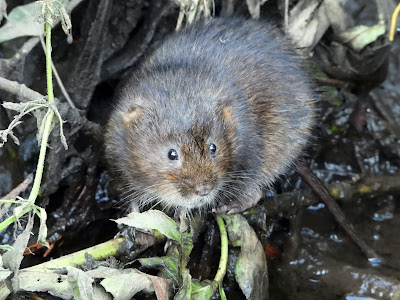After an absence of three weeks, I went down to check on the colony of voles at Edgeley Road, only to find this shocking state of pollution. The water is so thickly choked with scum, water voles are able to walk right across the surface and lay down droppings. Not being able to break into the water must be impacting on their ability to escape predators, surely.
As soon as I'd seen the state of the brook, I rang the 24-hour Environment Agency emergency hotline and reported the pollution and someone got onto it straight away. Turns out they've been dealing with the source for two weeks now - which is good in that they're already sure of the cause and are speaking to the landowner about it - but I'm wondering how long it will take for the hideous stuff to disappear and the water to clear.
Against all the odds I had quite a few sightings this evening: at least four voles, two of them adults and two juveniles. This is our strongest colony in Whitchurch, so it's vital they're protected. Otters also use this stretch. I really hope the EA speak to the people responsible in the strongest terms.





















































